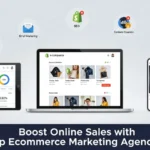
How AI is Revolutionizing Digital Marketing: A Practical Guide
- Introduction: The AI Revolution in Digital Marketing
- Step-by-step Instructions: Implementing AI in Your Digital Marketing Strategy
- Tips or Warnings: Best Practices and Potential Pitfalls
- Conclusion: Embracing the Future of Digital Marketing with AI
- Quick Summary
- FAQ
- Additional Resources / References
Introduction: The AI Revolution in Digital Marketing
AI is rapidly transforming digital marketing, offering unprecedented opportunities for businesses to connect with customers and optimize strategies. This guide explores how to effectively implement AI digital marketing strategies, providing a practical roadmap for success. The growing importance of AI in marketing is undeniable, with its potential to revolutionize every aspect of the customer journey.
Step-by-step Instructions: Implementing AI in Your Digital Marketing Strategy
Step 1: Understanding Your Marketing Goals
Before integrating any AI tools, it’s crucial to define clear marketing objectives. Are you aiming to increase lead generation, boost brand awareness, or improve sales? Identifying these goals will guide your tool selection and ensure that your AI implementation aligns with your overall business strategy. This clarity helps in measuring the success of your AI-powered marketing efforts.

Step 2: Identifying AI Tools for Your Needs
Choosing the right AI tools is essential for achieving your marketing goals. There are numerous AI tools available, each with unique functionalities. For example, AI-powered SEO tools can assist with keyword research and content optimization, while social media management tools can automate scheduling and analyze audience engagement. Consider factors like ease of use, integration capabilities, and cost when making your selection. To learn more about finding the right tools, consider reading our guide on Top AI Tools to Supercharge Your Keyword Research.

Step 3: Data Collection and Preparation
Data quality is paramount for AI success. Ensure the data you feed into your AI tools is accurate, relevant, and well-organized. This may involve cleaning your data, removing duplicates, and formatting it in a way that your AI tools can understand. The better your data, the more effective your AI-driven marketing will be. See how to get started with Boost Your Marketing: A Guide to Using Gemini to help with your data preparation.

Step 4: Implementing AI-Powered SEO Strategies
AI can significantly enhance your SEO efforts. Use AI tools for keyword research to identify high-value keywords, optimize content with AI suggestions, and analyze website performance to identify areas for improvement. How to Supercharge Your Google Ads with AI will show you how to get started. These strategies can lead to higher search engine rankings and increased organic traffic.

Step 5: AI-Driven Content Creation and Curation
AI can help you generate content ideas, write blog posts, and curate content for various platforms. Experiment with AI tools to streamline your content creation process and maintain a consistent flow of engaging content. However, always review and refine AI-generated content to ensure it aligns with your brand voice and messaging.

Step 6: Leveraging AI for Social Media Marketing
AI tools can automate social media scheduling, analyze audience behavior, and optimize ad campaigns. Use AI to identify the best times to post, understand your audience’s preferences, and tailor your ad campaigns for maximum impact. This automation can save you time and improve your social media ROI.

Step 7: AI-Powered Email Marketing Automation
Personalize your email campaigns with AI to segment audiences and improve open rates. AI can analyze user behavior and tailor email content to individual preferences, leading to higher engagement and conversion rates. Automate your email marketing workflows to nurture leads and build stronger customer relationships.

Step 8: Analyzing Results and Optimizing Campaigns
Continuously monitor the performance of your AI-powered marketing campaigns. Analyze key performance indicators (KPIs) to understand what’s working and what’s not. Use data-driven insights to make adjustments and optimize your campaigns for better results. Remember to keep an eye on the latest AI marketing trends for future improvements.

Tips or Warnings: Best Practices and Potential Pitfalls
Data Privacy and Ethical Considerations
Always prioritize data privacy and ethical considerations when using AI in marketing. Be transparent with consumers about how you are using AI and ensure you comply with all relevant data privacy regulations. Avoid using AI in ways that could be perceived as manipulative or deceptive.
The Importance of Human Oversight
While AI can automate many marketing tasks, human oversight is still crucial. Review AI-generated content, monitor campaign performance, and make adjustments based on your expertise and understanding of your audience. Boosting Your Digital Marketing: A Practical Guide to AI Implementation will show you how to successfully implement AI.
Staying Updated with AI Trends
AI is constantly evolving, so it’s essential to stay informed about the latest developments. Follow industry blogs, attend webinars, and experiment with new AI tools to stay ahead of the curve. Check out How AI is Revolutionizing Digital Marketing: A Comprehensive Guide for more information.
Conclusion: Embracing the Future of Digital Marketing with AI
Integrating AI into your digital marketing strategy can revolutionize your approach, increasing efficiency, personalization, and results. By following the steps outlined in this guide, you can harness the power of AI to achieve your marketing goals and stay competitive in the ever-evolving digital landscape. The future of marketing is here, and it’s powered by AI. Remember to prioritize ethical considerations and human oversight as you embrace this new era.
Quick Summary
This guide provides a step-by-step approach to integrating AI into your digital marketing strategy, covering SEO, content creation, social media, and email marketing. It emphasizes data preparation, tool selection, and the importance of human oversight while highlighting the ethical considerations and future trends in AI marketing.
FAQ
How can AI improve my SEO efforts?
AI can enhance SEO by automating keyword research, optimizing content, and analyzing website performance, leading to improved search engine rankings.
What are the ethical considerations of using AI in marketing?
Ethical considerations include ensuring data privacy, avoiding biased algorithms, and maintaining transparency with consumers about AI-driven marketing practices.
How can I choose the right AI tools for my marketing needs?
Select AI tools based on your specific marketing goals, considering factors like ease of use, integration capabilities, and the tool’s ability to meet your campaign objectives.
Additional Resources / References
- How AI is Revolutionizing Digital Marketing: A Comprehensive Guide
- Revolutionizing Digital Marketing with AI: A Complete Guide for 2025
- How AI is Revolutionizing Digital Marketing
- AI in Digital Marketing – The Ultimate Guide
- How AI is redefining marketing, today and tomorrow – Nielsen
- How to Supercharge Your Google Ads with AI
- Top AI Tools to Supercharge Your Keyword Research
- Boosting Your Digital Marketing: A Practical Guide to AI Implementation
- The Future of Digital Marketing: How AI is Changing the Game
- Boost Your Marketing: A Guide to Using Gemini



